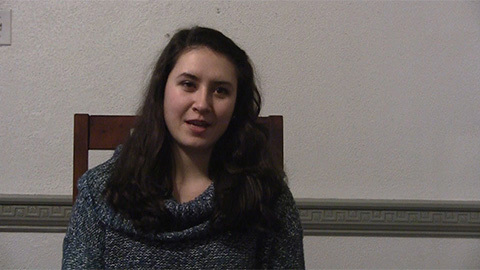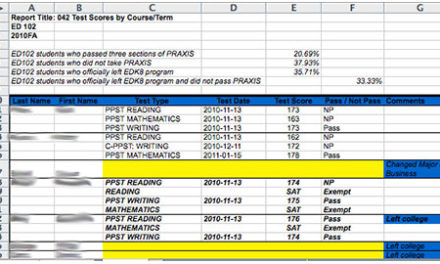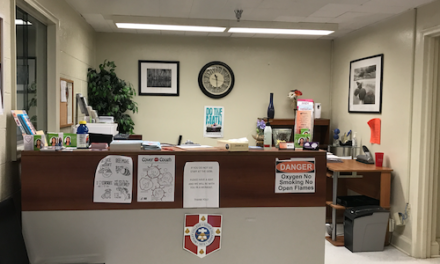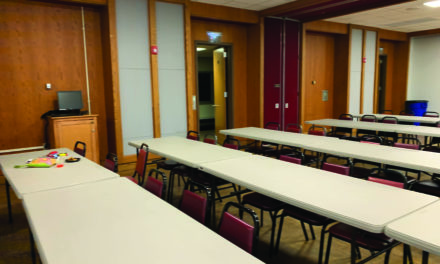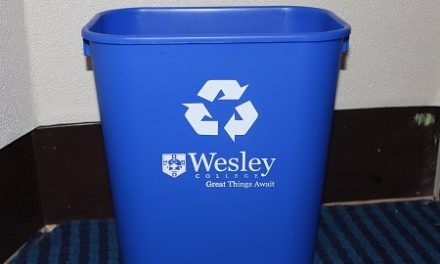by Jake Bradner and Emily Temple, Whetstone Staff Writers

Tiana Crosby
Tiana Crosby knew she would become a super senior by the end of her first semester.
“I was in Legal Studies, and halfway through I realized I didn’t want the major,†Crosby said.  “But I didn’t get out before the semester ended.  I failed a major course, and ended up at college an extra semester after changing to Psychology.â€
Crosby, like many Wesley students, took more than four years to complete her degree. Â In fact, according to Complete College America, only 19 percent of students at most 4-year colleges complete a degree within four years. Â
But an extended stay is not a death sentence.
“Students say they want to finish ‘on time,’ but the notion of strict ‘on time’ has to be fluid,†said Dr. Jeffrey Gibson, Interim Vice President for Academic Affairs. “When a student withdrew or didn’t pass a course, transferred a major, or has any other circumstances, the definition of ‘on time’ has to shift.â€
While Wesley and other colleges track data on retention rates over four- and six-year terms, there are few statistics available that show how many students are currently past their fourth year in college.
Gibson said this is due to the sheer number of factors, including transferring in and out of Wesley, taking semesters and even years off for family, and sports-related reasons. Â
“Students say they want to finish ‘on time,’ but the notion of strict ‘on time’ has to be fluid. When a student withdrew or didn’t pass a course, transferred a major, or has any other circumstances, the definition of ‘on time’ has to shift.â€
–Dr. Jeffrey Gibson, Interim Vice President for Academic Affairs
Gibson also said that Wesley is more homogenous in this respect than many public universities.
“At Wesley, most students fall into the traditional age range [for college students],†he said.  “At a public university, you’re more likely to find a variety of people in your classes outside this range, taking more time to complete their degrees or only attending college part-time.â€
Gibson, who attended the University of Central Florida, said he took five years to receive his bachelor’s degree.
“In the beginning, I took classes to feel ‘solid’ about college, then I caught up with summer courses and additional classes,†he said.
While Crosby’s change of major impacted her graduation time, she also said that her work ethic played a role.
“I should’ve turned in more work complete and on time,†she said.
Christina Montague also said that failing classes led her becoming a super senior.
“Some of my classes I had to repeat, some classes I could’ve taken over the summer, or at other schools,†she said.  “But I chose not to do that.â€
Junior Emily Bentz is concerned not about a lack of work, but an excess.
“Spring of Freshman year I officially declared myself a music major with a concentration in theory and composition, and then my sophomore year I added on English with a concentration in writing,†she said.
Bentz said she wasn’t prepared for the amount of work this would entail.

Dr. Jeffrey Gibson, Interim Vice President for Academic Affairs
“The way that it’s set up, senior year for music you have to do a capstone project, but senior year for English you have to do an internship,†she said.
While Bentz is not yet a super senior, she said she understands what consequences may arise from this status.
“Obviously, if I stay here longer, that means I’m going to have to be paying tuition, and I’d have to find a place to stay,†she said.
The most critical effect for many students is money.
According to Mike Hall, director of student financial aid, the cost of tuition can rise substantially as a student stays past four years.
“Although institutional aid doesn’t change, or isn’t affected by an extended completion, sometimes a student’s federal aid eligibility may be reduced,†Hall said.
“For example, if it takes longer than six years to complete a 4-year degree, federal aid may be exhausted based on the ‘Lifetime Eligibility Usage’ limits that the federal government imposes.â€Â
“If it takes longer than 6 years to complete a 4 year degree, federal aid may be exhausted based on the ‘Lifetime Eligibility Usage’ limits that the federal government imposes.â€
–Michael Hall, director of student financial aid
The cost is not always this clear, according to Complete College America, which considers an average of $45,327 in lost wages on top of tuition for each additional year of attendance.
Although the statistics on super seniors are difficult to track, Wesley has strategies in place to keep students on balance.
“Curriculum maps are set up so students should be able to be caught up within a four year period,†Gibson said.
He added that most professors are accommodating with students who need to catch up on a course or two.
“Wesley’s better at this than some universities where necessary courses are offered only once every few years,†he said.  “If a student is off-sequence at Wesley, most departments offer independent studies for their proposed graduation date.â€
Gibson said he is currently working with a student who needs credit for a class offered only in the fall semester.
An independent study is not always available, however.
“It’s all additional work on the part of the faculty, and most agree to it, but because it’s done so often it’s expected even when it’s not possible,†Gibson said.
Another measure open to students is to take required courses over the summer rather than during the fall or spring semester. Â These courses are offered both online and on campus. Â Â
“It’s better to start out strong and hard, that way if you do fall off a little bit, you can easily come back up, but it’s hard catching up when you fall off in the beginning.â€
–Christina Montague
Although the statistics on super seniors are difficult to track, Wesley has strategies in place to keep students on balance.
Emily Bentz is taking summer courses as a super-senior preventive measure.
“I found out that the only three that I needed were online,†she said.
“Since I live out of state, it’s easier to stay home and do them online instead of commuting here, and finding a job for the three or four days that I’m not in class during the week.â€
Montague says the best prevention is planning ahead.
“It’s better to start out strong and hard, that way if you do fall off a little bit, you can easily come back up, but it’s hard catching up when you fall off in the beginning.â€
Crosby agreed.
“If you think you’d do better with a change, make the change ASAP,†she said.  “Don’t wait for life to hand you something because oftentimes it won’t.â€
[metaslider id=4950]

